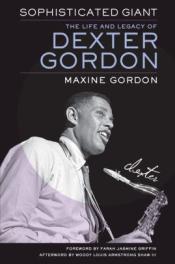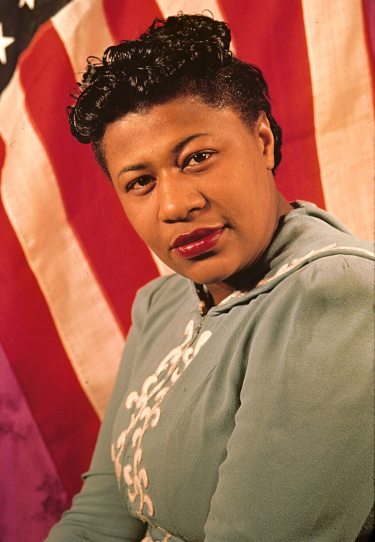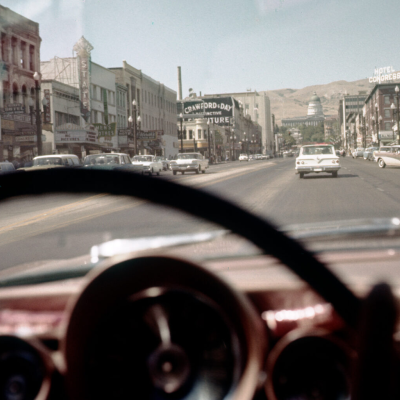.
.
“Great Encounters” are book excerpts that chronicle famous encounters among twentieth-century cultural icons. In this edition, Dexter Gordon tells the story of joining Louis Armstrong’s band in 1944, and how they enjoyed their intermission time. This story comes from Maxine Gordon’s biography of her late husband, Sophisticated Giant: The Life and Legacy of Dexter Gordon.
.
___
.
.
..
.
Excerpted from .Sophisticated Giant: The Life and Legacy of Dexter Gordon
by
Maxine Gordon
.
___
.
…..He was a born ambassador and he really was a beautiful, warm human being, just the way you hear him and see him on stage and on film. That was Louis. He was always the same, always a beautiful man.
…..I was working at the Club Alabam, which was a nightclub on Central Avenue with Lee Young (Lester’s younger brother) who was the leader of the band. Art Pepper was in the band. We had about six, seven men…Mingus was in the band too. This was a gig that was from eight to midnight. This is when they started having a curfew and everything closed at midnight. The after-hours joints would open up after the clubs closed. They were something like speakeasies. I was working out at a joint called Honey Murphy’s which was in deep Watts. We had Jesse Price, drummer out of Kansas City, with us. We had come up with Basie and the piano player was called Jack LaRue because he looked like the big movie star with the same name.
…..One night Louis’ manager came out and he heard me and then the next night Louis came out. I didn’t know he was there. After the set someone came over to me and said, “Son, say son, I really liked that sound you get.” I looked up and it was Louis. “Thank you, thank you very much.” It was a great honor. So that was the first night and then the next night, the manager came out and asked me if I’d like to join the band. By this time I felt that I had built on my foundation and I wanted to get back to New York so I joined the band and we did a couple of flicks in Hollywood. Atlantic City and Pillow to Post with Dorothy Dandridge and Ida Lupino. In those movies, they shot the scenes with Louis and the band and then when they showed the movies in the South, they would cut those scenes out.
…..Oh, that was a thrill. Every night. He had such a big, beautiful, fat, blaring sound, just ran right through you. And that was really the reason I joined the band, to play with him. To play with him every night. The band was a mediocre type band. He was playing the swing type arrangements from the ‘30’s…especially “Ain’t Misbehavin” and “I’m Confessin’.” The arrangements were just a showcase for him. But, he liked me and he always gave me a chance to blow. He featured me a lot.
…..All the memories and feeling – he was gorgeous, he really was. I knew he liked reefer and I brought several cans of some real Mexican moto down, tastes like the good earth, and took three drags, you, that’s all you need. So we left Hollywood, and went up the Coast to visit Frisco and Portland – we were doing theaters and we hadn’t got into the one-nighters, but this is on the West Coast so it’s a little different, but anyway whether it was the club date or the ballroom on every night, intermissions, I’d come out with my Mexican moto and he had a big paper bag full of, what do you call it, New Orleans Golden Leaf…So we’d trade off rounds of smoke and then after about a week or so I noticed that he didn’t bring out the Golden Leaf anymore. Another week or so goes by, so one night I said, “Pops, whatever happened to all that New Orleans Golden Leaf?” He said, “Shit, son, that’s like bringing a hamburger to a banquet.” So I mean, it was a great time in my life, with him.
…..Working with Louis was love, love, love…That was what it was all about. All love. He was just beautiful – always beautiful. It was just a gas being with him. He let me play all the time. He really dug me.
.
.
___
.
.

Excerpted from Sophisticated Giant: The Life and Legacy of Dexter Gordon, by Maxine Gordon
Used with permission of the Regents of the University of California, copyright 2018
.
___
.
Louis Armstrong sings “Ain’t Misbehavin'” from the movie Atlantic City. Dexter Gordon is also in the film, and can be seen in the front row of the saxophone section (to the viewer’s left)
.
.
.
.







































